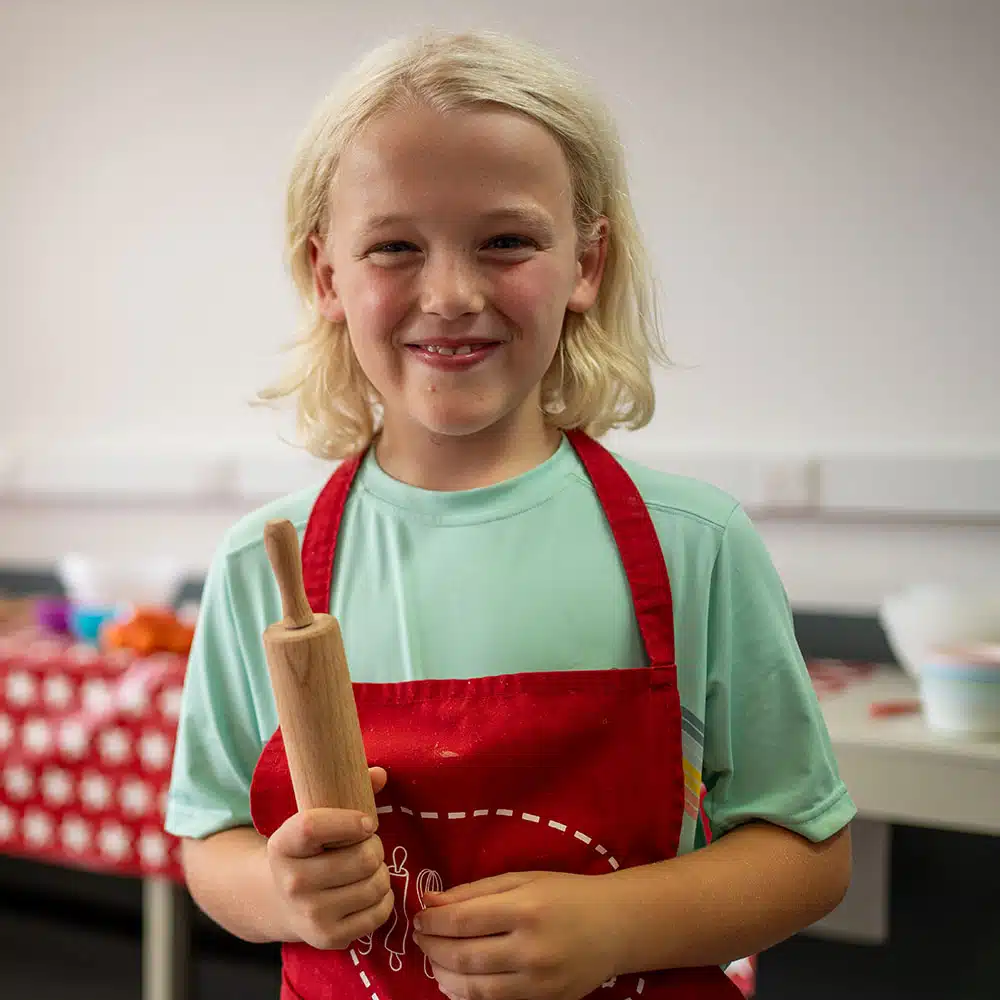Is your child a future culinary star? Introducing them to the world of baking and cooking can be an exciting and rewarding experience. However, ensuring safety is essential for making each cooking session as fun and accident-free as possible. In this guide, we’ll uncover why kitchen safety is so important and share ten practical tips to keep young bakers safe and sound. Let’s get cooking!
Why is kitchen safety important?
Kitchen safety is vital for preventing accidents and injuries, especially when young children are involved. By teaching basic kitchen safety tips for kids, we not only protect them from these dangers but also instil good habits that will serve them well throughout their lives.
10 safety tips when in the kitchen with kids
-
Always supervise
This might be obvious, but never leave children unattended in the kitchen. Whether they’re stirring batter or chopping vegetables, keep a watchful eye to prevent any mishaps. Your presence ensures that they follow the rules of the recipe and allows you to intervene promptly if needed.
-
Look out for common hazards
Kitchens are filled with potential hazards, including slippery spills, sharp knives and hot temperatures. Teach your children to recognise these dangers and avoid them to maintain a safe environment. For instance, keep knives out of reach and explain the importance of not touching hot pans or surfaces.
-
Wear appropriate clothing
When baking, choosing the right clothing is crucial for kitchen safety and comfort. Encourage kids to wear aprons to protect their clothes from spills and stains. For handling hot items, oven gloves are a must to protect both big and little hands from burns. Additionally, make sure they roll up any loose sleeves and tie back long hair to keep it safely away from the work surface.
-
Emphasise washing hands
Proper hygiene is key to preventing foodborne illnesses. By making handwashing a regular part of their cooking routine, they’ll learn the importance of cleanliness from a young age. So, make sure they wash their hands thoroughly with soap and water before and after handling food, especially raw ingredients.
-
Choose age-appropriate tasks
One of the most significant kitchen safety tips is assigning tasks based on the child’s age and skill level. Younger kids can help with measuring and mixing, while older ones might handle more challenging tasks like using the hob. Tailoring tasks to their abilities not only keeps kids safe but also boosts their confidence and enjoyment in the kitchen.
For more inspiration, see our blog on easy baking recipes to try at home.
-
Introduce kitchen tools
Introduce your kids to common kitchen tools, and opt for child-friendly utensils whenever possible. For instance, plastic knives are perfect for safely cutting soft fruits and vegetables because they’re easier to handle and reduce the risk of accidents. Demonstrate the proper way to use these tools so they understand how to handle them safely and effectively.
-
Handle hot items with care
Similarly, handling hot equipment like oven trays, kettles, and pans requires extra care. Children need to understand the risks associated with hot items, especially when they’re carrying, placing, or removing them. Use oven mitts or potholders to protect their hands, and always supervise kids closely.
-
Teach first aid
Accidents can happen, even in the safest kitchens. That’s why it’s important for kids to have basic first aid skills. Knowing how to treat minor burns or cuts can make a big difference. Be sure to keep a well-stocked first aid kit handy, including bandages, antiseptic wipes, and other essentials. And remember, if an emergency arises, don’t hesitate to seek professional medical help right away.
-
Practice fire safety
Fire safety is a crucial aspect of kitchen safety for kids. Make sure your young bakers understand the importance of keeping flammable items away from the stove like paper towels, and always being cautious around open flames. Educate them on what to do in case of a fire, such as how to safely use a fire blanket and the importance of alerting an adult immediately.
-
Keep clean
A clean kitchen is a safe kitchen. Encourage kids to clean up spills immediately to avoid slips and falls. Regularly sanitise surfaces and utensils to prevent cross-contamination. Keeping the kitchen tidy and organised not only enhances safety but also makes the cooking experience smoother and more enjoyable for everyone involved.
Go on a culinary adventure at PGL!
If you’re looking for a fun and educational experience beyond the kitchen, consider or Cooks Academy (for ages 11 to 16) at PGL!
These exciting programmes combine baking and cooking with adventurous outdoor activities, and can enhance any safety skills you’ve taught already making learning about kitchen safety a blast. It’s a great opportunity for kids to apply their basic cooking skills in a structured and supportive setting while having an unforgettable time.
So, what are you waiting for? Get in touch and we’ll be happy to assist you!
Don’t forget to check out our other adventure camps, including Aqua Explorer, Cool Science, and much more!


